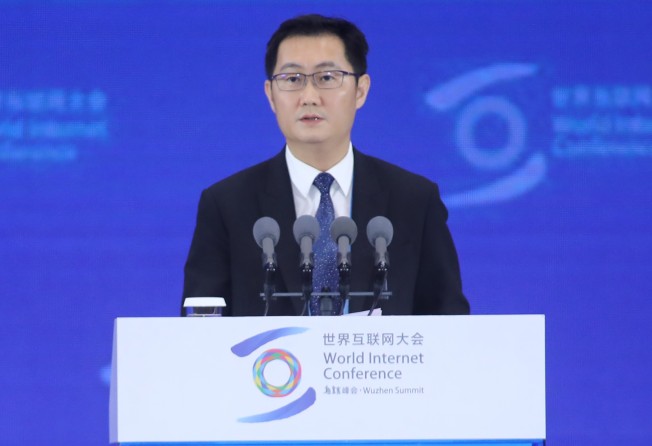Tencent’s Pony Ma emphasises social responsibility as anti-addiction measures cut gaming play time
- Ma said internet development has entered a ‘deep-water, no-man’s land’

Tencent Holdings co-founder and chairman Pony Ma Huateng said that internet platform companies should take the lead in bearing social responsibility for their products and services, even as anti-addiction measures cut playing time for its biggest business segment.
Speaking at the World Internet Conference in Wuzhen, China, on Wednesday, Ma also acknowledged the government’s support in fostering internet innovation, which has encouraged the company to “look to the future”. The Shenzhen-based company would not have grown from a start-up to a big tech company with more than 40,000 employees without support from China’s reforms and opening-up, he said.
“The development of the internet has entered a deep-water, no-man’s land with boundaries of responsibility blurred,” Ma said in a speech at the World Internet Conference in Wuzhen, China, on Wednesday. “Platform companies should stand up and take the social responsibility,” he said, without making a particular reference to games.
Ma is steering Tencent into the industrial internet, an area of focus for the Chinese government, which has made it a strategic priority to upgrade the country’s manufacturing base and digitise the world’s second-biggest economy.
In an open letter last week, Ma laid out the rationale for a recent restructuring of its business units to better focus resources on developing the industrial internet, which it sees as the future driver of economic growth.
The shift in focus is taking place at a time when the government is clamping down on the online gaming industry amid widespread social concern that excessive playing of video games is leading to addiction and enfeebling the nation’s young.
Tencent said on Tuesday that since its introduction of limits on playing time more than a year ago, the amount of time underage users spent online has decreased 52 per cent from the peak in 2017.
The company has progressively stepped up curbs on play time, before announcing that it will roll out its mandatory player identification to its entire stable of mobile and personal computer-based video games next year. Those under 12 will only get to play an hour each day, while those between 12 and 18 get two hours of play time. Tencent is also tying up with major smartphone manufacturers to link user profiles with their devices.
Tencent needs to work hard every day to come up with better solutions to problems and challenges thrown up by digitisation, such as internet safety, narrowing the digital divide, protecting user information and minors and artificial intelligence, Ma said in Wuzhen.
Tencent, which turns 20 this month, began as a start-up in Shenzhen’s Huaqiangbei electronics wholesale district. Today, Ma sits at the helm of a sprawling internet empire built on the pillars of online gaming, social networking and mobile payments, with a growing portfolio of investments in companies involved in everything from meal delivery to steel trading.
Supporting the digital transformation of China’s economy is in line with the government’s strategic goal of harnessing advanced technologies such as artificial intelligence to secure the country’s future in what has been dubbed the fourth industrial revolution.
Ma also said on Wednesday that he has decided to seriously consider developing a virtual reality version of WeChat, the most popular social-media platform in China with over 1 billion users, now that the technology will soon be supported by vastly improved transmission speeds enabled by 5G mobile networks.
WeChat’s mini program initiative, which offer applications that are smaller than 10 megabytes each and can run instantly on the popular social media app’s interface, was named one of the world’s leading internet, scientific and technological achievements at the Wuzhen conference on Wednesday.
The WeChat super app now has more than 1 million mini programs, which have 200 million daily active users and cover more than 200 industries, according to Ma in a statement. He also revealed that 1.5 million developers are involved in the development of mini programs, and that this innovation helped create 1.04 million jobs in China last year.